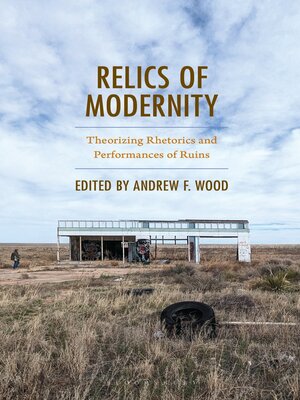Relics of Modernity
ebook ∣ Theorizing Rhetorics and Performances of Ruins · Bloomsbury Studies in Contemporary Rhetoric
By Andrew F. Wood

Sign up to save your library
With an OverDrive account, you can save your favorite libraries for at-a-glance information about availability. Find out more about OverDrive accounts.
Find this title in Libby, the library reading app by OverDrive.



Search for a digital library with this title
Title found at these libraries:
| Library Name | Distance |
|---|---|
| Loading... |
This collection of essays expands upon an emerging topic within and beyond the field of communication studies that challenges students and scholars of the built environment to peer beyond the somewhat typical collection of monuments, museums, and memories often found in essays related to space and place, to consider the role of ruins as lenses upon modernity.
These locales, which include economic ghost towns, industrial relics, prison sites, and other places associated with so-called dark tourism generally conjure feelings of melancholy, connotations of failure. While their assemblages of moldy floors, waterlogged walls, shattered windows, and sagging roofs do not make for traditional tourist snapshots, ruins possess a potential to inspire awe, an awareness of the tenuous nature of modern confidence, a reverence for the passing of things. In their inquiry and investigation, one may encounter oddly sublime traces and fragments of the contemporary age.
Seeking to better understand the rhetoric and performances of ruins, contributors to this book have crafted chapters that are theoretically sophisticated and vividly authored. The resulting collection of nine essays surveys ruins within and beyond the United States to examine a unique and unexpected constellation of ideas related to authenticity, identity, memory, representation, and power.
These locales, which include economic ghost towns, industrial relics, prison sites, and other places associated with so-called dark tourism generally conjure feelings of melancholy, connotations of failure. While their assemblages of moldy floors, waterlogged walls, shattered windows, and sagging roofs do not make for traditional tourist snapshots, ruins possess a potential to inspire awe, an awareness of the tenuous nature of modern confidence, a reverence for the passing of things. In their inquiry and investigation, one may encounter oddly sublime traces and fragments of the contemporary age.
Seeking to better understand the rhetoric and performances of ruins, contributors to this book have crafted chapters that are theoretically sophisticated and vividly authored. The resulting collection of nine essays surveys ruins within and beyond the United States to examine a unique and unexpected constellation of ideas related to authenticity, identity, memory, representation, and power.







